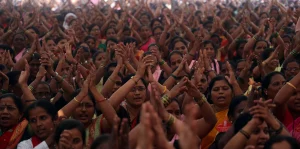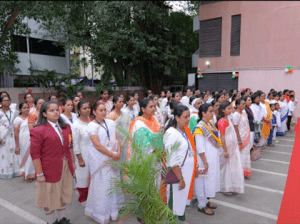Maharashtra has achieved a groundbreaking milestone in local governance with more than 50% of its Zilla Parishads now being headed by women. This unprecedented development represents a transformative shift in the state’s rural administrative landscape, demonstrating the growing influence of women in Maharashtra’s political sphere. The emergence of Maharashtra Zilla Parishads’ women leaders signals a new era of inclusive governance that prioritises grassroots development and community welfare.
State officials have highlighted this achievement as a major step toward gender-inclusive governance, emphasising how Maharashtra Zilla Parishad women are reshaping rural administration. This development comes at a crucial time when Maharashtra is focusing on strengthening its three-tier panchayati raj system, which includes Zilla Parishads at the district level, Panchayat Samitis at the block level, and Gram Panchayats at the village level.

Also Read: Maharashtra Zilla Parishad women
Other: Sanjay Raut Vs Ajit Pawar
Maharashtra’s Zilla Parishads have been instrumental in rural development since their establishment in 1962, following the Maharashtra Zilla Parishads and Panchayat Samitis Act of 1961. These district-level bodies serve as the apex institution of the panchayati raj system, coordinating development activities and ensuring effective governance delivery to rural populations.
The current wave of Maharashtra Zilla Parishads’ women’s leadership represents a significant departure from traditional male-dominated local politics. With constitutional provisions mandating 33% reservation for women in panchayati raj institutions, the fact that more than 50% leadership has been achieved demonstrates the state’s commitment to exceeding minimum requirements and embracing genuine gender equality in governance.
The rise of Maharashtra Zilla Parishad women leaders reflects broader societal changes in the state’s political landscape. These women leaders bring diverse perspectives to rural governance, often prioritising issues such as healthcare, education, water management, and social welfare programs that directly impact community well-being.
Maharashtra’s political environment has been particularly conducive to women’s participation in local governance. Recent policy initiatives, including various welfare schemes targeting women, have created an ecosystem where Maharashtra Zilla Parishad women can effectively campaign and govern. The state’s emphasis on inclusive development has provided platforms for women to demonstrate their administrative capabilities and policy expertise.
The increased representation of Maharashtra Zilla Parishads’ women has already begun showing positive impacts on rural development priorities. Women leaders typically focus on holistic development approaches that address community needs comprehensively, leading to more effective implementation of government schemes and programs.


The electoral success that has led to Maharashtra Zilla Parishads women comprising more than 50% of leadership positions reflects changing voter preferences and increased political awareness among rural populations. Voters are increasingly recognising women candidates’ capabilities and their potential contributions to local governance.
This trend aligns with Maharashtra’s broader political evolution, where women’s participation in electoral processes has steadily increased. The success of Maharashtra Zilla Parishads’ women candidates demonstrates that merit-based politics is gaining ground over traditional patronage systems, leading to more qualified and dedicated leadership at the local level.
Maharashtra Zilla Parishads’ women leaders have introduced innovative approaches to traditional governance challenges. Their leadership style often emphasises collaborative decision-making, transparent administration, and community engagement, resulting in more effective policy implementation and better citizen satisfaction.
Many of these women leaders have leveraged technology and digital platforms to enhance service delivery, making government services more accessible to rural populations. The Maharashtra Zilla Parishads’ women leadership has also been instrumental in promoting sustainable development practices and environmental conservation initiatives at the district level.


The state government’s continued support for women’s political participation creates opportunities for further expansion of Maharashtra Zilla Parishads’ women’s leadership. Capacity building programs, leadership development initiatives, and policy reforms are being implemented to strengthen women’s role in local governance.
Maharashtra’s achievement in having more than 50% of its Zilla Parishads headed by women sets a benchmark for other states across India. This development demonstrates that meaningful women’s participation in governance is not only possible but can also lead to more effective and inclusive administration.
The success of Maharashtra Zilla Parishads’ women leaders is likely to inspire similar transformations in other states, potentially accelerating India’s journey toward gender-equal political representation. As these leaders continue to demonstrate their capabilities and deliver results, they are reshaping perceptions about women’s roles in Indian politics and governance.
The prospects for Maharashtra Zilla Parishads’ leadership appear promising, with continued policy support, evolving social attitudes, and demonstrated administrative success, creating a conducive environment for sustained growth in women’s political participation and leadership at the local governance level.

